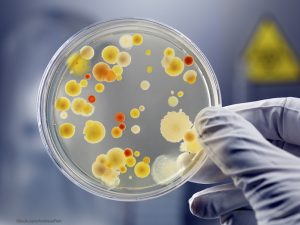A study published in the online journal Antimicrobial Agents and Chemotherapy (56:1434-1443. 2012) found that antibiotic-resistant bacteria are found in agricultural soils. The soils were treated with manure from animals fed sub-therapeutic doses of antibiotics.
 Should consumers be concerned about this study, especially as gardening season approaches?
Should consumers be concerned about this study, especially as gardening season approaches?
Dr. Francisco Diez-Gonzalez, professor of Food Safety Microbiology at the University of Minnesota, told Food Poisoning Bulletin that recommending any action to the consumer based on a single publication is a bit premature.
Still, using untreated or raw manure in soils that are used to grow vegetables for human consumption can be dangerous. There is a documented case of a child contracting E. coli 0157:H7 from garden soil recently fertilized with cattle manure.
Dr. Diez-Gonzalez recommends that if consumers want to fertilize soils with non-synthetic materials, they should use composted material, preferably a commercial brand. That may offer some assurance that the composting process was properly done.
“Proper composting is known to kill pathogenic bacteria and could probably help in reducing antibiotic strains,” he stated. “But if it is done without controls it may still contain pathogenic bacteria.”
Food Poisoning Bulletin asked about a study conducted at the University of Delaware that showed that plants may take up pathogens through their root systems.
Dr. Diez-Gonzalez stated, “The internalization of foodborne pathogenic bacteria via the roots of plants is still a topic of debate among scientists since it has only been observed at very high bacterial counts, which may not be representative of real life. Assuming that the internalization of bacteria actually happens, if the consumer follows the recommendations for soil fertilization it would be prevented.”




